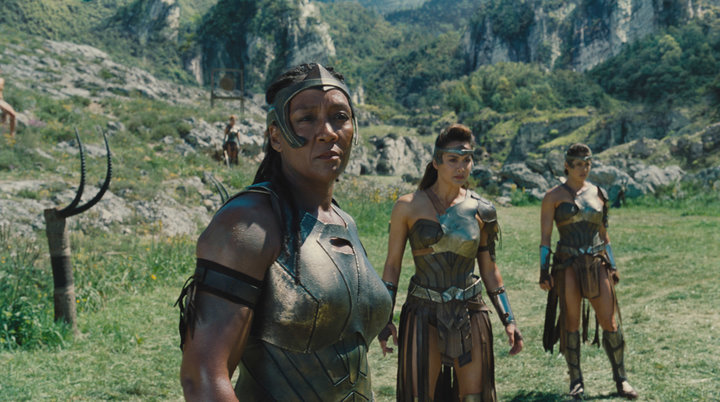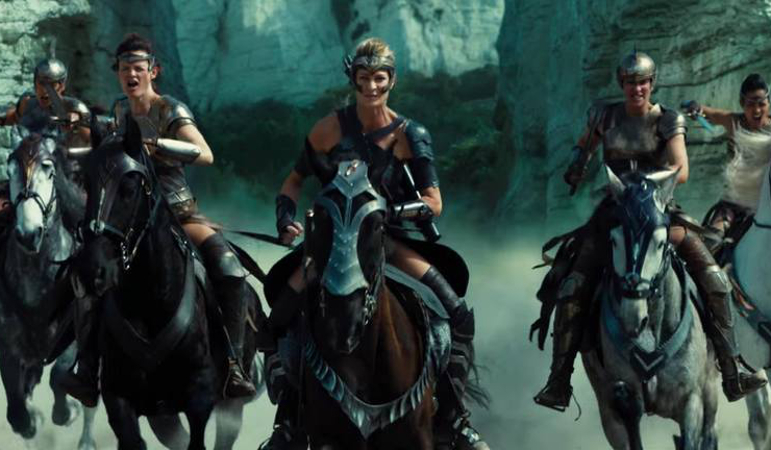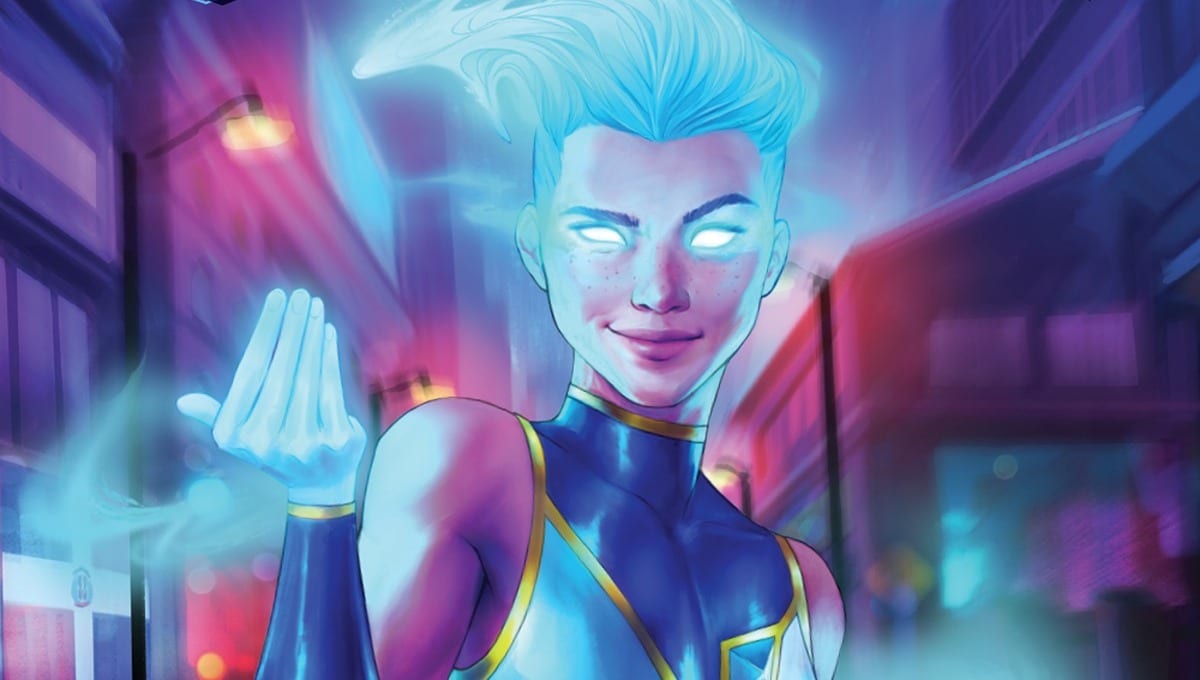 by Andrea Ayres
by Andrea Ayres
Two panels. Two vastly different views of Wonder Woman, the movie.
It is one of the last panels of Comic-Con, a discussion of how to move beyond the strong female character. The audience skews mostly female, not surprising considering the topic. It only takes a few minutes for the film Wonder Woman to be mentioned and when it is, the audience erupts in applause.
It was a vastly different response to others I’d experienced elsewhere at Comic-Con. This group cheers while another sighs, disappointed for the representation of their bodies and voices that never quite seems to materialize. All of these women had seen the same film but had experienced it in distinctly different ways.
***
Released domestically on June 2, 2017, the DC Comics movie from Warner Bros. has quickly become the highest grossing domestic film of the summer, making over $750 million worldwide. Directed by Patty Jenkins (Monster) with writing from Allan Heinberg, Zach Snyder and Jason Fuchs, the film has also been received warmly by critics. It’s been a welcome success for the DC Extended Universe (DCEU) which has been marred by a string of lackluster box office performances.
Women led films are exceedingly rare in Hollywood, those given a budget of $150 Million places Jenkins in a league of her own. In an interview with The Hollywood Reporter, Jenkins says she cannot take on the history of over 50% of the world’s population simply because she’s a woman. That, of course, hasn’t stopped people from trying to task her with exactly that.
Opportunities like the one Jenkins was given are so few and far between that when they do come along, there’s an almost inevitability to the kind of pressure Jenkins refers to. As fans, we want to see the movie do well. Hell, not just well, we want to see the movie blow past even the most hardened skeptics expectations. A preemptive strike against those who would write off the success as anomaly or use the film as an example for why diversity in popular culture just doesn’t sell (P.S. it does).
***
Shortly after Wonder Woman’s release, women began sharing their deeply emotional experiences with the film on social media. From Diana’s (Gal Gadot) childhood on an island of women, to exquisite battle sequences, to being hushed and trivialized by male characters, it was simply something we hadn’t seen depicted so well on film before. For many, the first thirty minutes of film showing women delighting in battle, in power, and competition were some of the most emotionally charged of the film.
The movie gave women’s bodies space to breathe during action scenes. It’s a visual audiences are not generally afforded. Not only does the camera not shy away from the full power of a bodies in motion, it slowed them down. It demanded the audience appreciate the relationship of grace, muscle, and power of the Amazonians. The film allows for physical strength to coexist with emotion. Indeed, it is only through Diana’s ownership of her emotional core that she is able to realize her true potential as a demigoddess. The film is a triumph some 75 years in the making. That triumph, however, does not come without tiresome and predictable caveats.
***
During the Sunday afternoon panel about moving beyond the strong female character, writer Alicia Lutes (Nerdist) talked about the internal conflict she experienced reviewing Wonder Woman. While she enjoyed the movie, she did not believe it was flawless. Lutes spoke of the pressure she felt as a woman to help lift this movie up precisely because these opportunities for women in film, in particular women warriors in film, are so rare. Ultimately, Lutes reviewed the movie faithfully and honestly to how she experienced it, but wanted to discuss this inner struggle at Comic-Con. That struggle is an important inflection point.
On the first day of Comic-Con, the Women in Comics Collective (WinC) hosted a panel to discuss race, gender, and diversity in comics. It was a panel comprised entirely of women of color, a rarity not only at Comic-Con but across nearly all forms of media. Mention of Wonder Woman solicited murmurs and sighs from the audience. Panelists shook their heads and exhaled a sigh for what might have been.
Speaking over email with Regine Sawyer (creator and organizer of WinC) I asked her to share her thoughts about Wonder Woman and the disconnect between how white women and women of color seemed to experience the film.
“I think there’s a disconnect in terms of how the film can be received as both barrier breaking and stifling. For white women, it breaks the barrier for their narrative, but not that of women of color due to how the WoC in the movie were portrayed. As Black Women, we are very much used to putting ourselves in another’s shoes, and resonating with them. That’s due to us being accustomed to not seeing ourselves reflected in the media and in history. With that said, I enjoyed Wonder Woman immensely, but would have liked to see the WoC characters have more pivotal and active roles on the island…yes they could fight, but where was the heart?”
Where was the heart? It was a sentiment that would be felt and expressed numerous times during Comic-Con, including at the Roxane Gay question and answer session Saturday morning. It was an opportunity not seized to expand the role and visibility of women of color in a major summer film.
When I asked Sawyer about the portrayal of Artemis (Ann J. Wolfe) and Philippus (Ann Ogbomo) in the movie she said: “What I find the most interesting about those characters, is that I don’t remember much about them. There were more than several women of color in those first scenes, and although it was wonderful to have visual representation, most of them had very few to no lines at all. For me, they faded out as quickly as they faded in. They were apart of the ambiance, but not the story.”
Over a year ago, writer Ira Hobbs (Blavity) talked about the important role black women have in the canon of Wonder Woman and expressed his fears about the upcoming film. In May, just before film’s release, writers Maya Rupert (The Atlantic) and Monique Jones (Slash Film) discussed their complicated relationship with DC Comic’s Wonder Woman as well as their hopes for the film. Each expressed a guarded, tentative optimism that the filmmakers might use use their unique position to update and highlight the roles of women of color within Themyscira.
In a piece published after Wonder Woman’s release, Cameron Glover (Harper’s Bazaar) examined the movie’s problematic depictions of black women. Glover delves into issues like the use of the black caretaker trope and erasure and diminishment of important characters, like Diana’s sister Nubia and leader of the Amazon military, Philippus. At the conclusion of Glover’s piece, she acknowledges the film as an immense step forward for women and women-led filmmaking. And there is little doubt that it is exactly that, but it was close to being so much more to so many more.
Sawyer is not under any misapprehension of who the film was meant to be about, “Wonder Woman was the main character, but if she is going to have supporting characters, let them be such. Let them have a leg and a voice to stand on. There were several high ranking officials on the island that were WoC, it would have been wonderful to hear more from them.”
***
It’s not about making the perfect film or even believing that any single work could fully address or correct the ills of society. It’s about propelling ourselves and the media we create to push beyond visibility. It’s about taking that leap to ensure that everyone has a voice, because too often white women expect other women to support and applaud their steps forward even as they themselves are held back, erased, or excluded.
We sat in theatres crying with pride, with joy, and in reflection of what it meant to see a place like Themyscira on film through the lens of a female director. We posted images of children dressed as Wonder Woman under the banner of “Representation matters!” And if this is true, then the representation of us all must matter to each of us always.
***
For more information about the Women in Comics Collective: WinC will be hosting events during NYCC 2017, both on and offsite. Check their website womenincomicsnyc and their Twitter Account @Womenincomicsny for updates.



 by Andrea Ayres
by Andrea Ayres




Why people dont take them seriously..always looking for something, anything, to complain about…
This is the sort of article that will prompt the usual array of WMC’s (white male crybabies) to come out and complain that the conversation about representation is unjustified, etc.
We are at an odd point in history. There are a rising number of good roles for WoC in Hollywood, and they are increasing, although there tend to be more on TV than there are in the movies. However, we just came out of a year that saw Hidden Figures as one of the most popular films of the year. Black Panther has a nearly all black cast, including formidable actors like Danai Gurira, who plays Michonne–bad ass zombie killer on The Walking Dead. Also upcoming is the action movie Proud Mary with a black female protagonist ( https://www.youtube.com/watch?v=FWQcAgQxiRI ). On Legends of Tomorrow, we had both Vixen and Hawkgirl. In the upcoming Deadpool 2, the actress playing Domino is a WoC.
Yet, at the same time we have this rising tide of roles for WoC, we have a backlash from a vocal segment of the media consuming community who have varying motivations for their opposition. Some are purists who want all characters to look like they do in the comics (although they seem to accept costume deviations more readily than ethnic ones). Some are devoted to particular characters and sincerely concerned about film’s faithfulness to their own vision of what they think the character should be like. Some object to the discussion itself because they apparently think that their own lack of interest in the topic means that everyone is tired of it. Some just don’t like to acknowledge that people from marginalized groups are also allowed to express opinions and preferences and have a right to be represented in the media. And some have deep-rooted racial problems and try to cloak these in complaints about reverse racism, or “SJW’s” inflicting their will on the media, etc. The majority of these varied groups seek to diminish the point of view of proponents of diversity by belittling them directly or characterizing their concerns as “complaining,” and in doing so, such individuals basically complain about others complaining.
I think it would diffuse some of the criticism if the advances of WoC was acknowledged rather than take the position that there has been no progress. The panel mentioned in the article was about moving past the “strong female character.” I wish more of that panel discussion had been brought up in terms of how Wonder Woman fits in. I’m wondering how the panelists define “strong female character.” If they mean “male-like physically combative female, a) there are numerous characters that break that stereotype, some of whom have been portrayed in movies, and b) a panel on not having “strong female characters” in superhero comics is a bit confusing.
@Clint Aaron, you belittle and then complain about belittling. Do you even read what you write?
My form of “backlash,” if you choose to call it that, is that the people who wanted more WOC representation really didn’t care about whether WOC had a vital role to play in the story; they wanted representation at the expense of the story.
Back in 2011, I remember one critic bitching about the lack of strong black characters in CAPTAIN AMERICA THE FIRST AVENGER. The gist of his complaint was that he really didn;’t want a film about Captain America, he wanted a Black Panther film to suit his needs, and didn’t care if that made a good Cap film.
When one group gets the vast majority of roles all of the time, then there will be squabbling over the few times a chance opens up for others. We need to address this imbalance going forward, so that more opportunities are created throughout all movies for non white male characters.
Excellent piece, Andrea – and right on target. Your conclusions are powerful and well-articulated. Let’s hope someone involved with the second movie reads this!
How about we try to phrase this as “This was a great movie! Now let’s make a better one!”
Wow, first comment in and it’s a slam against women. Never change, comic readers, never change….
I think this was an excellent piece. What I love about this great movie is that it has inspired more great conversations about moving the industry forward. It also proved that a female hero can sell tickets- a lot of them. I’ve seen it twice and it was even better on the second viewing. Movies like Wonder Woman and Mad Max(with Charlize Theron) demonstrate that a great movie and great casting-that also just happens to include great women characters can sell. That is what drives Hollywood and pretty much everything else. I am just glad that someone at Time Warner finally had the balls to approve the movie. :)
Comments are closed.